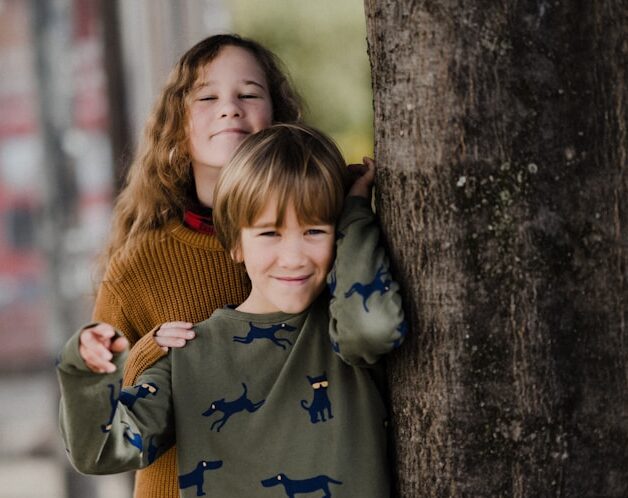A story of when a child discloses abuse. It all began with subtle hints.
My 10-year-old niece, Sarah, had spent the summer with her dad and seemed her usual, cheerful self.
But as her return to her mom’s house approached, her mood changed.
She became quiet and clingy and continued asking if she had to return to her mom’s.
At first, we attributed it to a tough adjustment and not wanting to leave friends.
But the fear in her eyes told us this was something more.
Recognizing these subtle hints was the first crucial step in understanding the gravity of the situation.

One night, I sat on the edge of her bed, and she started to tell me a story about a “friend” who spent a lot of time at her mom’s house.
I didn’t know what to say or do, but I knew my reaction was critical.
I took a few deep breaths and said,
“Thank you for telling me this. You are safe here, and you did nothing wrong.”
My niece dared to tell her story, and we took the following steps to take action in order to keep her safe.
The CALM Approach is An Empowering Tool in Responding to Disclosure
If your child ever discloses abuse, remember that staying calm and supportive is vital.
Your response can shape their healing process and trust moving forward.
This is your moment to shine as a supportive figure in their life; Remember C.A.L.M.:
Your role in creating safety is crucial. Your child needs to know they’re safe and not at fault. Say things like,
“I’m so proud of you for telling me. You’re safe now, and this isn’t your fault.”
Reassure them that you’re there to protect them. Children who experience abuse often internalize feelings of shame or guilt.
You’re laying the groundwork for emotional healing by affirming their bravery and innocence.
Creating safety also means ensuring the immediate physical environment is secure.
If your child is in imminent danger, remove them from the situation and contact authorities immediately.
Emotional safety, however, is just as important. Avoid dismissing their feelings or minimizing the problem.
Simple gestures like maintaining eye contact and providing physical comfort (if they agree) can help reassure them.
Hearing such news can trigger strong emotions. It’s natural to feel anger, heartbreak, or even denial, but keeping those feelings in check is crucial.
A calm presence shows your child they did the right thing by coming to you.
If you panic or display uncontrolled anger, they might shut down, worry about upsetting you further, or even blame themselves.
Your emotional control can significantly impact the child’s response.
Instead of reacting impulsively, take a moment to collect yourself.
Focus on your breathing and remind yourself that your child needs your support, not your distress.
If you find yourself overwhelmed, it’s okay to step away briefly to regain composure—make sure your child knows they’re not being abandoned.
Let your child talk at their own pace. Avoid interrupting, correcting, or expressing disbelief. Say things like,
“I’m here to listen whenever you’re ready,”
or
“Thank you for trusting me with this.”
Avoid asking too many questions or probing for details that could overwhelm or confuse them.
Your belief in them matters most at this moment. Children often fear they won’t be believed, especially if the abuser is someone close to the family.
You’re sending a powerful message by listening without judgment:
“Your feelings and experiences are valid, and I’m here for you.”
It’s also helpful to use open-ended prompts like,
“Tell me more about what happened,”
while avoiding leading questions that might inadvertently shape their narrative.
Keep in mind that your role is to support, not to investigate.
Take the next steps to protect your child.
This means reporting the abuse to authorities and seeking professional help.
In Utah, all adults are mandatory reporters.
This means you are legally required to report any suspected abuse, whether or not you’re sure it occurred.
Your job is not to collect evidence or prove if a child is telling the truth.
Simply sharing what your child disclosed is enough to initiate an investigation.
To report abuse in Utah, you can call the Department of Child and Family Services at 1-855-323-3237 or contact any local law enforcement agency.
When making the report, provide as much information as possible, including the child’s name, the alleged abuser’s name (if known), and the nature of the abuse.
While making the report might feel daunting, remember that this step is essential to ensuring your child’s safety and holding the abuser accountable.
Seeking professional support is also critical.
Therapists, counselors, and child advocates at organizations like the Children’s Justice Center can provide specialized care for your child and family.
Therapy can help your child process their emotions, rebuild their sense of self-worth, and develop coping mechanisms for the challenges ahead.

That night with my niece, I felt helpless at first.
But staying calm and supportive gave her the courage to keep talking, and we were able to get her the help she needed.
It was a long road to recovery, but Sarah began to heal with the right support systems in place.
She found strength in her voice and reclaimed a sense of safety and trust that had been shaken.
If you ever face a child whom discloses abuse, remember CALM—it’s a simple way to respond with love and strength when your child needs you most.
Creating safety, managing your emotions, listening without judgment, and taking decisive action will set the stage for your child’s recovery and resilience.
Understanding the legal and emotional aspects of responding to abuse is critical.
Beyond reporting and therapy, consider reaching out to local support groups or organizations that specialize in supporting survivors of abuse.
These resources can provide valuable guidance, connect you with others who have faced similar situations, and help you navigate the complexities of the legal and emotional journey ahead.
Above all, please remind your child that they are not alone.
Abuse can leave lasting scars, but with patience, compassion, and professional help, healing is possible.
Your unwavering support can make all the difference as they embark on their path to recovery.
